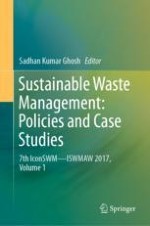2020 | OriginalPaper | Buchkapitel
Developing the Circular Economy in South Africa: Challenges and Opportunities
verfasst von : Aifani C. Tahulela, Harry H. Ballard
Erschienen in: Sustainable Waste Management: Policies and Case Studies
Verlag: Springer Singapore
Aktivieren Sie unsere intelligente Suche, um passende Fachinhalte oder Patente zu finden.
Wählen Sie Textabschnitte aus um mit Künstlicher Intelligenz passenden Patente zu finden. powered by
Markieren Sie Textabschnitte, um KI-gestützt weitere passende Inhalte zu finden. powered by
